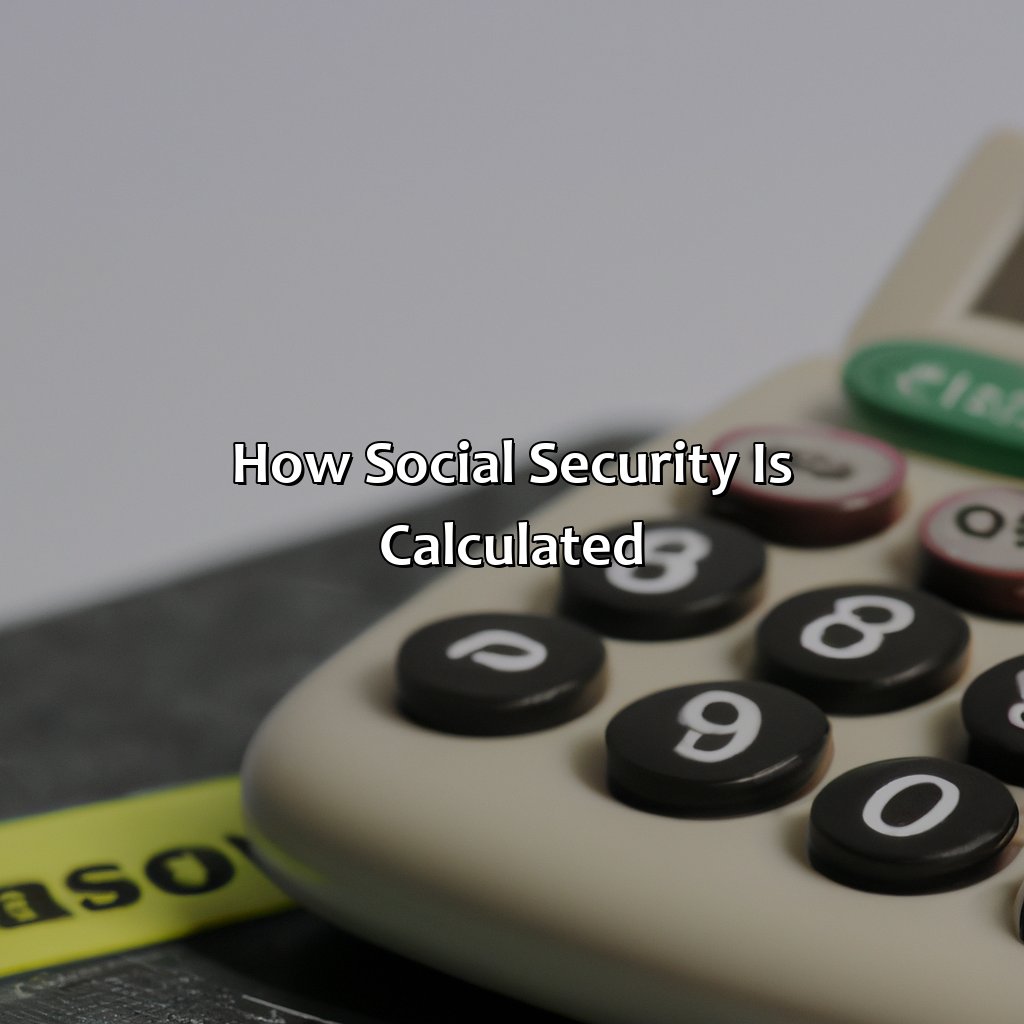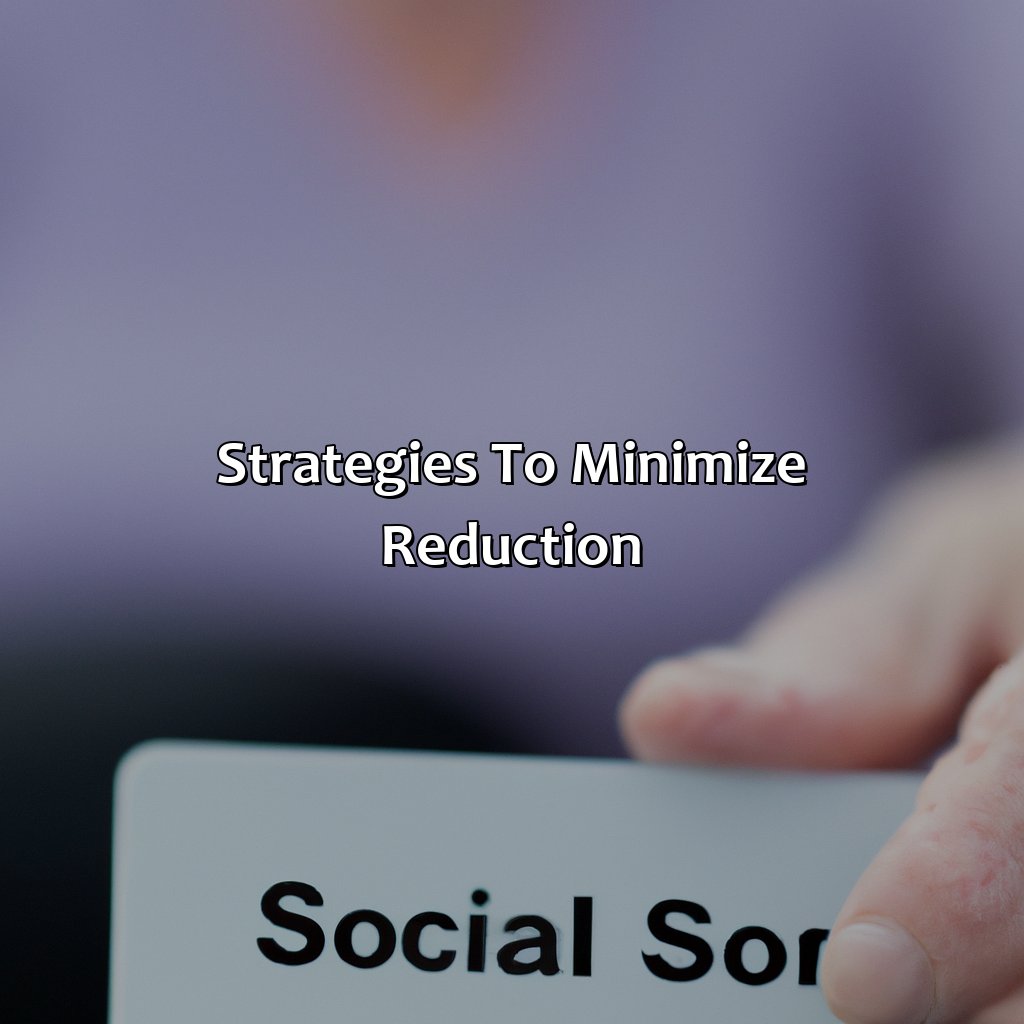How Much Will My Social Security Be Reduced If I Have A Pension?
Key Takeaway:
- Having a pension can affect your Social Security benefits through the Windfall Elimination Provision (WEP) or the Government Pension Offset (GPO).
- The WEP reduction is based on a formula that lowers your Social Security benefit by a certain percentage depending on your number of years of substantial earnings outside of Social Security-covered employment. The maximum reduction for 2021 is $498 per month.
- The GPO reduction applies to individuals who receive a pension from a federal, state, or local government job and are also entitled to receive Social Security benefits as a spouse, divorced spouse, or survivor. The reduction is based on two-thirds of the amount of the pension and can completely offset any Social Security benefit.
Worried about how a pension might affect your Social Security benefits? You’re not alone. This article will help you understand how a pension might reduce or eliminate your Social Security benefits. Discover your financial future – and how to plan for it.
Understanding Social Security and Pension
Social Security Reductions Due to Pension
Are you receiving a pension? If so, your Social Security benefit may be reduced. Let us explore the relationship between Social Security and Pension to determine the potential impact on your monthly benefit. Find out how much pension you will get and how it could affect your Social Security.
The Impact of Pension on Social Security
Social Security benefits are calculated based on the individual’s earnings history. However, if you receive a pension from an employer who does not withhold Social Security taxes, your Social Security benefit may be reduced through the Windfall Elimination Provision or the Government Pension Offset. The reduction in benefits can vary depending on the amount of the pension and years of employment that were not covered by Social Security.
Factors Affecting Social Security Reductions
The reduction in Social Security benefit also depends on whether the pension is from federal, state, or local government employment. Additionally, receiving a spousal or survivor benefit from Social Security may be impacted if the individual is also receiving a pension. It is crucial to understand all the factors that affect Social Security and Pension to determine the impact on your retirement income.
Don’t Miss Out on Maximizing Your Benefits
Missing out on potential Social Security benefits due to a lack of understanding can have a significant impact on your retirement income. By educating yourself on the relationship between Social Security and Pension, you can make informed decisions to maximize your benefits. Don’t leave money on the table – seek professional guidance to ensure you are receiving all the benefits you are entitled to.

Image credits: retiregenz.com by Adam Washington
How Social Security is Calculated
For accurate Social Security benefits, it’s key to grasp how it’s calculated. We’ll dissect primary insurance amount (PIA), average indexed monthly earnings (AIME), and bend points. Breaking down the sub-sections will give you a better comprehension of Social Security calculations. This way, you can make informed choices about your retirement.

Image credits: retiregenz.com by Adam Arnold
Primary Insurance Amount (PIA)
The amount of money an individual can get from Social Security is determined by their Primary Insurance Amount (PIA). PIA calculation depends on many factors, including the person’s highest 35 years of earnings and age at retirement. However, pensions or other government benefits can reduce PIA.
If an individual is eligible for both Social Security and a pension, their benefits could be reduced due to the Windfall Elimination Provision (WEP) or Government Pension Offset (GPO). These provisions aim to limit double-dipping and ensure fairness in distribution. The WEP reduces the Social Security benefit for workers who didn’t pay much into Social Security but will receive a pension based on non-Social Security-covered work. GPO affects spousal or survivor benefits by reducing them by two-thirds of the government pension.
It’s essential to note that there are some exceptions to these rules based on specific circumstances, such as certain types of federal employment or serving in the military before 1957. Individuals can consult with an SSA representative or use online resources for personalized calculations.
An example of how pensions can affect Social Security was seen during the Great Depression. In response to widespread unemployment, Congress passed legislation in 1935 that included creating a national retirement system called Social Security. This program aimed to provide financial support for retired workers while taking a percentage of earnings from both employers and employees to fund future benefits. However, due to political opposition mainly from southern states that favored pensions instead, provisions were added that excluded certain groups like domestic and agricultural workers initially.
If you’re average, you’ll love the Average Indexed Monthly Earnings (AIME) calculation. But if you’re above average, sorry, no participation trophies here.
Average Indexed Monthly Earnings (AIME)
The AIME stands for the Average indexed Monthly earnings and is used to determine your social security benefits. Calculated over all the years of your highest income-earning, this determines the average monthly earnings used to calculate your primary insurance amount.
| Year | Covered Earnings | Index Factor(2021) |
|---|---|---|
| 1979 | $10,500.00 | 6.97 |
| 1980 | $11,100.00 | 6.65 |
It’s essential to keep in mind that not including any particular year can have a considerable impact on the calculation results. Furthermore, reducing your income through employer-sponsored pensions or other means can also reduce your social security benefits by a significant amount. Don’t miss out on maximizing your social security benefits. Speak with financial advisors or social security experts to determine how much you are eligible for and how to optimize these crucial retirement benefits to secure a worry-free life after retirement. Even social security knows you’re going to have to bend a few points in your retirement plan.
Bend Points
The Social Security calculation is determined by several factors, including Bend Points. These points are used to determine the amount of your monthly benefit based on your earnings history.
Below is a table outlining the Bend Points for 2021:
| Year | First Bend Point | Second Bend Point |
|---|---|---|
| 2021 | $996 | $6,002 |
These points are adjusted each year to account for inflation. If your earnings fall below the First Bend Point, you will receive a larger percentage of your pre-retirement income in Social Security benefits. However, if your earnings exceed the Second Bend Point, your benefits will be reduced.
It’s important to note that the calculations can become complicated if you have other sources of income, such as a pension. Your Social Security benefits may be reduced based on your pension income and how many years you paid into Social Security while earning that pension.
AARP reports that over half of all people who receive a public pension in the United States do not pay into Social Security through their government jobs—and they may be subject to these complex rules regarding Windfall Elimination Provision (WEP) and Government Pension Offset (GPO).
Overall, understanding how Bend Points work can help you estimate what your Social Security benefits will look like in retirement. It’s worth taking the time to learn about these calculations to ensure you are well-prepared for retirement.
Looks like your pension just got blown away by the Windfall Elimination Provision.
Windfall Elimination Provision (WEP)
Let’s check out the Windfall Elimination Provision (WEP). It may bring down Social Security benefits for folks with pensions from non-Social Security work. We’ll look at WEP and how it affects benefits. Plus, examples of benefit reductions due to WEP.

Image credits: retiregenz.com by Adam Arnold
How WEP Affect Social Security benefits
WEP can significantly affect social security benefits for those with pensions. It considers a pension amount when calculating the social security benefit, leading to a reduced payout. The reduction is based on a specific formula, and the extent varies depending on the size of the pension benefit.
Furthermore, those who receive a government pension may be subject to an offset from their Social Security spousal or survivor benefit. The exact reduction amount depends on the elements included in the calculation formula.
For those impacted by WEP, it’s essential to understand how it affects your benefits and plan accordingly. Several strategies are available that can help maximize payouts. You may also be interested in calculating how much your private pension increases each year.
It is vital to note that the Windfall Elimination Provision affected more than 1.9 million beneficiaries in December 2020. The provision helps ensure that individuals with fewer years spent in covered employment aren’t at a disadvantage when calculating their social security benefits.
Prepare for the great WEP-ing as your social security gets sliced and diced with these examples of reduction.
Examples of WEP Reduction
Reductions in Social Security benefits due to Windfall Elimination Provision (WEP) may leave many wondering about the extent of their losses from not realizing their full Social Security benefit. Here are some possible impacts:
- Individual Pension – If you have a pension from work, your WEP reduction can be a maximum of $480 per month.
- Family Members’ Pensions – The maximum WEP reduction for combined pensions received by a worker and a family member from non-covered work is $591 per month.
- No Pension Reductions for those without any pension fall under lesser categories of “20 Year Rule Defense” or lower average indexed monthly earnings.
- A Break in Social Security Contributions – If there is a break in the years you paid into social security, resulting in fewer than 20 contributing years, then WEP reductions will be less.”
- Pension From Government Work Abroad – A pension from foreign government employment will also impact your WEP reduction.
- Federal Employee Retirement System (FERS) or Civil Service Retirement System (CSRS) WEP does not apply if you began federal employment after Dec.31, 1983.
One unique point to bear in mind is that concurrent receipt of both Social Security and Disability Insurance Benefits and FERS/CSRS retirement benefits do affect eligibility for certain health care benefits, disability insurance benefits. Injured members must weigh affordability against retaining certain important federal protections.
It’s not uncommon for individuals to reconsider their options before retirement, especially when it comes to how much money they’ll take home each year. One informant said he was shocked when he learned his full age-66 benefit would be reduced by more than 50% due to earlier receiving a local government pension.
Looks like Uncle Sam wants to double-dip into your retirement- brace yourself for the Government Pension Offset (GPO).
Government Pension Offset (GPO)
Grasp the influence your pension can have on your social security benefits!
Let’s take a gander at the Government Pension Offset (GPO). Its effects on social security benefits and GPO reduction examples will be discussed.

Image credits: retiregenz.com by Joel Arnold
How GPO Affect Social Security benefits
Social Security benefits are affected by the Government Pension Offset (GPO). This reduction depends on the amount of the pension received. If the pension is substantial, it can lead to a dollar-for-dollar reduction in Social Security payments.
The impact of GPO on Social Security benefits can be significant. It can potentially result in a complete loss of Social Security benefits, especially for those with higher pensions. This can lead to financial difficulties in retirement.
It is important to note that not all public pensions are subject to GPO. Those who have government pensions and are unsure about how GPO will affect their Social Security benefits should consult with the relevant authorities to help understand their options.
In order to minimize the impact of GPO on Social Security benefits, seniors may consider delaying receipt of their pensions until after they start receiving Social Security payments or review other options such as Spousal Benefits or Dependency and Indemnity Compensation (DIC) from Veterans Affairs. By taking necessary steps, retirees can mitigate the consequences of GPO and maximize their retirement income.
“Why save for retirement when the government can just offset your social security with a pension?”
Examples of GPO Reduction
The GPO rule significantly affects social security benefits for those who have a pension. Here are some examples of GPO reduction:
- For every two dollars received from a government pension, social security will be reduced by one dollar.
- If the monthly government pension is more than $2,083, then social security benefits will be eliminated entirely.
- Social security benefits under spousal or survivor’s insurance may also be affected by GPO reductions.
- If there are multiple pensions, then the GPO reduction applies to each pension individually.
- The GPO reduction may also impact tax calculations on social security benefits.
It’s important to note that this rule acts differently depending on your personal circumstances. For example, if you receive a small government pension, your social security benefit might not see any reduction at all.
According to the Social Security Administration’s website, approximately 650,000 people were impacted by the GPO rule as of 2015.
Time to channel your inner Houdini and escape the clutches of GPO – here are some strategies to minimize the pension reduction:
Strategies to Minimize Reduction
Minimize Social Security benefit losses with a pension? Solutions!
- Delay benefits.
- Cut pension or take a lump sum.
- Work for a certain number of years in covered employment.
- There you go!

Image credits: retiregenz.com by James Duncun
Delay Social Security Benefits
Postponing your Social Security benefits can significantly reduce the reduction caused by a pension. When you delay claiming benefits until 70, the credit rate increases by 8% every year, leading to an enhanced monthly payment of up to 132% than if you claim at full retirement age.
Delaying benefits can be a great way for many retirees to fill in gaps left by pensions that do not cover their expenses fully. Social Security provides steady and predictable monthly income that will help them not have to rely on their pension alone.
Delaying Social Security is especially worth considering when one has a defined benefit plan paying them high enough pensions as they may easily hit the SS earnings test limits. However, it is essential to examine all aspects before making any decision.
Pro Tip: Understand your circumstances and weigh the pros and cons of postponing your social security benefits before making a final decision.
Choosing between a reduced pension and a lump sum is like choosing between a slow descent into mediocrity or a quick jump into the unknown.
Reduce Pension or Take a Lump Sum
One option for those receiving a pension while also eligible for Social Security is to either reduce their pension or take a lump sum payment. This can help to minimize the reduction in Social Security benefits caused by the Windfall Elimination Provision and Government Pension Offset. However, it’s important to carefully consider the pros and cons of each option before making a decision. Reducing your pension may provide a higher lifetime payout, while taking a lump sum payment may offer more flexibility with your finances.
In addition, there are other strategies that can be employed to minimize the reduction in Social Security benefits. These include delaying claiming Social Security until age 70, earning additional credits to increase your benefit amount, and maximizing your spouse’s benefit through various claiming strategies.
It’s crucial to make informed decisions about these issues as they can have a significant impact on your retirement income. Consulting with a financial planner or knowledgeable advisor can be beneficial in determining which option and strategy are best suited for your individual situation. Don’t miss out on potential benefits because of a lack of knowledge or planning – find out what your pension will be when you retire and take action today!
Work hard now, so you can enjoy the fruits of your labor later – unless you plan on being a professional beach bum, then carry on.
Work for a Certain Number of Years in Covered Employment
To increase your Social Security benefits and reduce the reduction of payments, you need to work for a certain number of years in employment covered by Social Security. This requirement is known as the “work credit.”
By earning more work credits, you can minimize the reduction of your Social Security benefits if you have a pension. The number of years needed to earn work credits depends on your age and the year you were born. For example, if you were born after 1929, you need to earn at least 10 work credits (4 credits per year) to qualify for retirement benefits.
\n\nTo know how much you pay into your pension, it is important to check with your employer or pension provider. They can give you a detailed breakdown of your contributions and how they impact your retirement benefits.
Working for a specific period in covered employment helps ensure that the Social Security Administration has sufficient records of your earnings history. By doing so, it can calculate your average indexed monthly earnings (AIME), which is an important factor in determining your payment amount.
One pro tip is to keep track of all records and receipts as proof for any employment recognized under Social Security law. Doing so may help ensure maximum payment amounts upon retirement.
Some Facts About How Much Will My Social Security Be Reduced If I Have a Pension:
- ✅ The Windfall Elimination Provision (WEP) can reduce your Social Security benefit by up to $498 per month in 2022. (Source: Social Security Administration)
- ✅ The Government Pension Offset (GPO) can reduce your spousal or survivor Social Security benefit by up to two-thirds of your pension amount. (Source: AARP)
- ✅ WEP and GPO only affect individuals who receive a pension from a federal, state, or local government job that did not pay Social Security taxes. (Source: Social Security Administration)
- ✅ The reduction in Social Security benefits due to WEP and GPO can be offset by other retirement income, such as a 401(k) or IRA. (Source: Motley Fool)
- ✅ The rules for calculating the reduction in Social Security benefits due to WEP and GPO can be complex and confusing, so it’s important to seek professional advice if you’re unsure. (Source: Kiplinger)
FAQs about How Much Will My Social Security Be Reduced If I Have A Pension?
How much will my social security be reduced if I have a pension?
If you are receiving a pension from a job where you did not pay Social Security taxes, your Social Security benefit may be reduced. This reduction is commonly known as the Windfall Elimination Provision (WEP) or Government Pension Offset (GPO). The reduction amount varies and depends on several factors such as your work history and pension amount.
How is my Social Security benefit reduced due to a pension?
The reduction amount is calculated using a formula that considers the number of years you paid Social Security taxes and the amount of your pension. The WEP can reduce your Social Security benefit by up to $498 per month in 2022. The GPO can reduce spousal or survivor benefits by up to two-thirds of your pension amount.
Is there a way to avoid the Social Security benefit reduction?
Unfortunately, there is no way to avoid the reduction if you receive a pension from a job where you did not pay Social Security taxes. However, if you have a part-time or full-time job where you do pay Social Security taxes, your benefit may not be affected by the WEP or GPO.
Are all pensions subject to Social Security benefit reduction?
Not all pensions are subject to Social Security benefit reduction. Only pensions from jobs where you did not pay Social Security taxes may be subject to the WEP or GPO. If you paid Social Security taxes throughout your career, your Social Security benefit will not be affected by a pension from that same job.
How can I find out if my pension will reduce my Social Security benefit?
You can contact the Social Security Administration to find out if your pension will affect your Social Security benefit. They can provide you with an estimate of your benefit amount including the reduction due to the WEP or GPO.
Can I receive both a pension and Social Security at the same time?
Yes, you can receive both a pension and Social Security at the same time. However, your Social Security benefit may be reduced due to the WEP or GPO if you receive a pension from a job where you did not pay Social Security taxes.


